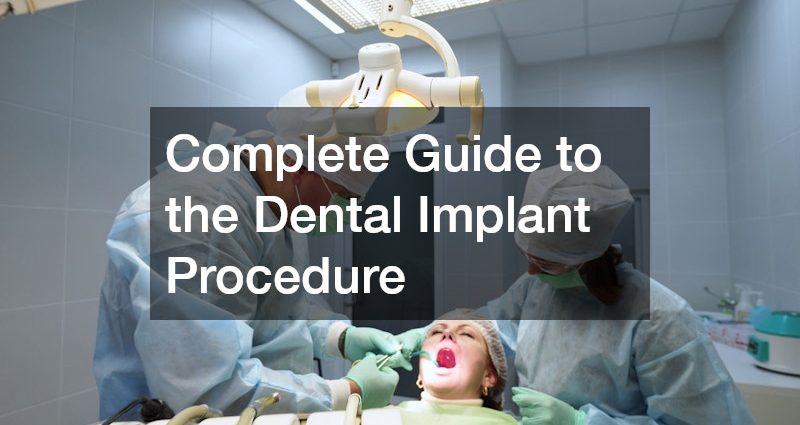
For anyone looking to replace missing teeth with a natural-looking and durable solution, dental implants are one of the most advanced options available today. This comprehensive guide covers everything you need to know about the dental implant procedure—from understanding what implants are to learning about recovery, cost, and long-term care. Whether you’re just beginning to research or preparing for treatment, this guide will help you make an informed decision about your dental health.
What Are Dental Implants?
Dental implants are artificial tooth roots made of biocompatible materials, typically titanium, that are surgically placed into the jawbone. Once integrated, they provide a stable foundation for replacement teeth such as crowns, bridges, or dentures.
They function and feel much like natural teeth, restoring both appearance and oral health.
Components of Dental Implants
A complete dental implant consists of three main parts:
-
Implant Post: The titanium screw that is inserted into the jawbone to act as the tooth root.
-
Abutment: A small connector piece that attaches to the implant post and holds the crown in place.
-
Crown: The visible portion of the implant, designed to look like a natural tooth.
Types of Dental Implants
The two most common types are endosteal implants, which are placed directly into the jawbone, and subperiosteal implants, which sit on top of the jawbone beneath the gum tissue. Endosteal implants are the most widely used due to their superior stability and success rate.
Difference Between Implants and Other Dental Solutions
Unlike dentures or bridges, dental implants are permanent and do not rely on adjacent teeth for support. They also help prevent bone loss in the jaw, a common problem after tooth extraction, making them a more sustainable long-term solution.
Who Should Consider Dental Implants?
Ideal candidates for dental implants are individuals with healthy gums, sufficient bone density, and good overall oral hygiene. People missing one or more teeth due to decay, injury, or disease can benefit significantly from implants. However, those with certain medical conditions or insufficient bone may require additional treatments like bone grafting.
How Is the Dental Implant Procedure Performed?
Initial Consultation and Planning
The process begins with a detailed consultation and examination. Your dentist or oral surgeon will take X-rays, 3D scans, and impressions of your teeth to plan the implant placement. This phase ensures that the implants are positioned for optimal strength and aesthetics.
Surgical Procedure Stages
The surgery typically involves multiple stages. First, the implant post is surgically placed into the jawbone. After several months of healing, a process called osseointegration occurs—where the bone fuses with the implant. Once healed, the abutment is attached, followed by the placement of the permanent crown.
Recovery Time and Process
Recovery varies per patient but generally takes a few weeks to a few months. During this period, maintaining proper oral hygiene and following dietary recommendations are crucial to successful healing.
Potential Risks and Complications
As with any surgery, there are potential risks, including infection, nerve damage, or implant failure. However, these complications are rare when performed by qualified dental professionals and with proper aftercare.
Follow-Up Appointments and Adjustments
Regular follow-up visits allow your dentist to monitor healing and ensure the implants are properly integrated. Adjustments may be made to the crown for comfort and alignment.
What Is the Cost of Dental Implants?
Factors Influencing Cost
The total cost of dental implants depends on several factors, including the number of teeth being replaced, type of implant used, need for bone grafting, and geographic location.
Insurance and Financing Options
Some dental insurance plans cover part of the cost, especially if the implants are medically necessary. Many dental offices offer financing options or payment plans to make treatment more accessible.
Long-Term Value of Implants
Although the upfront cost of dental implants may be higher than other options, their durability and minimal maintenance make them cost-effective over time. Implants can last decades, often a lifetime, with proper care.
Cost Comparison with Other Treatments
Compared to bridges and dentures, dental implants have a higher initial cost but offer superior functionality, comfort, and longevity, eliminating the need for frequent replacements.
What Are the Benefits of Dental Implants?
Improved Aesthetic Appearance
Dental implants restore your smile by closely mimicking natural teeth in color, shape, and function. They also help maintain facial structure by preventing bone loss.
Enhanced Comfort and Eating Ability
Unlike removable dentures, implants stay firmly in place, allowing you to eat and speak confidently without discomfort or slippage.
Durability and Longevity
Dental implants are incredibly durable. With proper oral hygiene, they can last 25 years or more, outperforming other restoration options.
Boosted Oral Health
Implants promote jawbone stimulation, preventing deterioration and supporting the health of surrounding teeth. They also reduce the need to alter adjacent teeth, unlike traditional bridges.
How to Care for Dental Implants?
Daily Oral Hygiene Practices
Brush twice daily using a soft-bristled toothbrush and non-abrasive toothpaste. Flossing around implants helps prevent plaque buildup and gum inflammation.
Professional Cleaning and Maintenance
Regular dental checkups and professional cleanings every six months ensure implants remain healthy and well-maintained.
Signs of Implant Problems
Be alert for signs such as redness, swelling, or pain around the implant site. Early detection and professional care can prevent complications.
Preventative Measures
Avoid smoking and excessive alcohol, as both can delay healing and increase the risk of implant failure.
Long-Term Care Tips
With consistent care, dental implants can last a lifetime. Maintain good oral hygiene habits, visit your dentist regularly, and avoid using teeth as tools to open objects.
Dental implants provide a permanent, natural-looking, and highly functional solution for missing teeth. They not only enhance your appearance but also promote better oral health and confidence. By understanding the procedure, costs, benefits, and care requirements, you can make an informed decision about whether dental implants are right for you. When performed by skilled professionals and maintained with proper care, dental implants can deliver lasting results and transform your smile for life.


